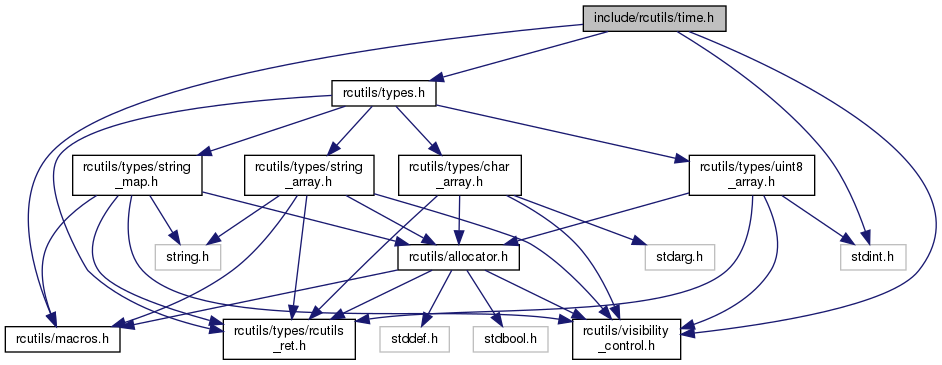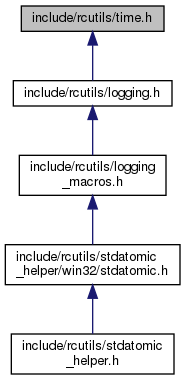#include <stdint.h>#include "rcutils/macros.h"#include "rcutils/types.h"#include "rcutils/visibility_control.h"

Go to the source code of this file.
Macros | |
| #define | RCUTILS_S_TO_NS(seconds) (seconds * (1000LL * 1000LL * 1000LL)) |
| Convenience macro to convert seconds to nanoseconds. More... | |
| #define | RCUTILS_MS_TO_NS(milliseconds) (milliseconds * (1000LL * 1000LL)) |
| Convenience macro to convert milliseconds to nanoseconds. More... | |
| #define | RCUTILS_US_TO_NS(microseconds) (microseconds * 1000LL) |
| Convenience macro to convert microseconds to nanoseconds. More... | |
| #define | RCUTILS_NS_TO_S(nanoseconds) (nanoseconds / (1000LL * 1000LL * 1000LL)) |
| Convenience macro to convert nanoseconds to seconds. More... | |
| #define | RCUTILS_NS_TO_MS(nanoseconds) (nanoseconds / (1000LL * 1000LL)) |
| Convenience macro to convert nanoseconds to milliseconds. More... | |
| #define | RCUTILS_NS_TO_US(nanoseconds) (nanoseconds / 1000LL) |
| Convenience macro to convert nanoseconds to microseconds. More... | |
Typedefs | |
| typedef int64_t | rcutils_time_point_value_t |
| A single point in time, measured in nanoseconds since the Unix epoch. More... | |
| typedef int64_t | rcutils_duration_value_t |
| A duration of time, measured in nanoseconds. More... | |
Functions | |
| rcutils_ret_t | rcutils_system_time_now (rcutils_time_point_value_t *now) |
| rcutils_ret_t | rcutils_steady_time_now (rcutils_time_point_value_t *now) |
| Retrieve the current time as a rcutils_time_point_value_t object. More... | |
| rcutils_ret_t | rcutils_time_point_value_as_nanoseconds_string (const rcutils_time_point_value_t *time_point, char *str, size_t str_size) |
| Return a time point as nanoseconds in a string. More... | |
| rcutils_ret_t | rcutils_time_point_value_as_seconds_string (const rcutils_time_point_value_t *time_point, char *str, size_t str_size) |
| Return a time point as floating point seconds in a string. More... | |
Macro Definition Documentation
◆ RCUTILS_S_TO_NS
| #define RCUTILS_S_TO_NS | ( | seconds | ) | (seconds * (1000LL * 1000LL * 1000LL)) |
Convenience macro to convert seconds to nanoseconds.
◆ RCUTILS_MS_TO_NS
| #define RCUTILS_MS_TO_NS | ( | milliseconds | ) | (milliseconds * (1000LL * 1000LL)) |
Convenience macro to convert milliseconds to nanoseconds.
◆ RCUTILS_US_TO_NS
| #define RCUTILS_US_TO_NS | ( | microseconds | ) | (microseconds * 1000LL) |
Convenience macro to convert microseconds to nanoseconds.
◆ RCUTILS_NS_TO_S
| #define RCUTILS_NS_TO_S | ( | nanoseconds | ) | (nanoseconds / (1000LL * 1000LL * 1000LL)) |
Convenience macro to convert nanoseconds to seconds.
◆ RCUTILS_NS_TO_MS
| #define RCUTILS_NS_TO_MS | ( | nanoseconds | ) | (nanoseconds / (1000LL * 1000LL)) |
Convenience macro to convert nanoseconds to milliseconds.
◆ RCUTILS_NS_TO_US
| #define RCUTILS_NS_TO_US | ( | nanoseconds | ) | (nanoseconds / 1000LL) |
Convenience macro to convert nanoseconds to microseconds.
Typedef Documentation
◆ rcutils_time_point_value_t
| typedef int64_t rcutils_time_point_value_t |
A single point in time, measured in nanoseconds since the Unix epoch.
◆ rcutils_duration_value_t
| typedef int64_t rcutils_duration_value_t |
A duration of time, measured in nanoseconds.
Function Documentation
◆ rcutils_system_time_now()
| rcutils_ret_t rcutils_system_time_now | ( | rcutils_time_point_value_t * | now | ) |
This function returns the time from a system clock. The closest equivalent would be to std::chrono::system_clock::now();
The resolution (e.g. nanoseconds vs microseconds) is not guaranteed.
The now argument must point to an allocated rcutils_time_point_value_t object, as the result is copied into this variable.
| Attribute | Adherence |
|---|---|
| Allocates Memory | No |
| Thread-Safe | Yes |
| Uses Atomics | No |
| Lock-Free | Yes |
- Parameters
-
[out] now a datafield in which the current time is stored
- Returns
RCUTILS_RET_OKif the current time was successfully obtained, or-
RCUTILS_RET_INVALID_ARGUMENTif any arguments are invalid, or -
RCUTILS_RET_ERRORif an unspecified error occur.
◆ rcutils_steady_time_now()
| rcutils_ret_t rcutils_steady_time_now | ( | rcutils_time_point_value_t * | now | ) |
Retrieve the current time as a rcutils_time_point_value_t object.
This function returns the time from a monotonically increasing clock. The closest equivalent would be to std::chrono::steady_clock::now();
The resolution (e.g. nanoseconds vs microseconds) is not guaranteed.
The now argument must point to an allocated rcutils_time_point_value_t object, as the result is copied into this variable.
| Attribute | Adherence |
|---|---|
| Allocates Memory | No |
| Thread-Safe | Yes |
| Uses Atomics | No |
| Lock-Free | Yes |
- Parameters
-
[out] now a struct in which the current time is stored
- Returns
RCUTILS_RET_OKif the current time was successfully obtained, or-
RCUTILS_RET_INVALID_ARGUMENTif any arguments are invalid, or -
RCUTILS_RET_ERRORif an unspecified error occur.
◆ rcutils_time_point_value_as_nanoseconds_string()
| rcutils_ret_t rcutils_time_point_value_as_nanoseconds_string | ( | const rcutils_time_point_value_t * | time_point, |
| char * | str, | ||
| size_t | str_size | ||
| ) |
Return a time point as nanoseconds in a string.
The number is always fixed width, with left padding zeros up to the maximum number of digits the time point can represent. Right now that is 19 digits (so 19 characters) for a signed 64-bit integer. Negative values will have a leading -, so they will be one character longer than the positive values.
The recommended minimum size of the input string is 32 characters, but 21 ( or - for sign, 19 digits, null terminator) should be sufficiently large for both positive and negative values. If the given string is not large enough, the result will be truncated. If you need a string with variable width, using snprintf() directly is recommended.
| Attribute | Adherence |
|---|---|
| Allocates Memory | No [1] |
| Thread-Safe | Yes |
| Uses Atomics | No |
| Lock-Free | Yes |
[1] if snprintf() does not allocate additional memory internally
- Parameters
-
[in] time_point the time to be made into a string [out] str the output string in which it is stored [in] str_size the size of the output string
- Returns
RCUTILS_RET_OKif successful (even if truncated), or-
RCUTILS_RET_INVALID_ARGUMENTif any arguments are invalid, or -
RCUTILS_RET_ERRORif an unspecified error occur.
◆ rcutils_time_point_value_as_seconds_string()
| rcutils_ret_t rcutils_time_point_value_as_seconds_string | ( | const rcutils_time_point_value_t * | time_point, |
| char * | str, | ||
| size_t | str_size | ||
| ) |
Return a time point as floating point seconds in a string.
The number is always fixed width, with left padding zeros up to the maximum number of digits for the mantissa that the time point can represent and a characteristic (fractional-part) with a fixed width of 9 digits. Right now that means the mantissa is always 10 digits to add up to 19 total for the signed 64-bit time point type. Negative values will have a leading -, so they will be one character longer then positive values.
The recommended minimum size of the input string is 32 characters, but 22 ( or - for sign, 19 digits, decimal point, null terminator) should be sufficient for now. If the given string is not large enough, the result will be truncated.
| Attribute | Adherence |
|---|---|
| Allocates Memory | No [1] |
| Thread-Safe | Yes |
| Uses Atomics | No |
| Lock-Free | Yes |
[1] if snprintf() does not allocate additional memory internally
- Parameters
-
[in] time_point the time to be made into a string [out] str the output string in which it is stored [in] str_size the size of the output string
- Returns
RCUTILS_RET_OKif successful (even if truncated), or-
RCUTILS_RET_INVALID_ARGUMENTif any arguments are invalid, or -
RCUTILS_RET_ERRORif an unspecified error occur.
 1.8.13
1.8.13